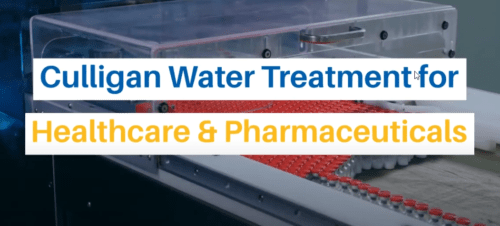Water Treatment Solutions for Pharmaceutical Industry
Without properly treated water, many processes become vulnerable to contamination that can put products at serious risk. Treated water is especially crucial to the pharmaceutical industry, as contamination can reap harmful consequences to consumers. Through the use of proper water treatment solutions, pharmaceutical manufacturers can maintain water purity to ensure the safety and integrity of their products.
Importance of Water Treatment in the Pharmaceutical Industry
All occupied facilities require access to treated water, especially buildings in the pharmaceutical and medical industries. For instance, if your company runs a manufacturing process involving water packaging, these processes risk contamination due to exposure to bacterial endotoxins, compromising the safety of your product. To prevent contamination, you need onsite pharma water treatment systems that prevent the buildup of mycobacterium avium complex and pseudomonas.
Pharmaceutical buildings require three main tiers of treated water to meet safety standards across multiple applications. These tiers include purified water, highly purified water, and water for injection.
Purified Water and Highly Purified Water
Applications often use purified water for dilution in non-sterile product manufacturing and to keep equipment consistently clean. Additionally, pharmaceutical applications use purified and highly purified water as pretreatment to prepare water for injection. Reverse osmosis is often used to produce purified water because of its low cost, efficiency, and ability to protect systems from bacteria and salts.
Some of the popular applications for purified and highly purified water include:
- Manufacturing pills from drugs. Processes often use purified water to prepare medication in the form of orally consumed pills that individuals absorb through digestion.
- Non-injectable drugs. Many non-injectable products use purified water, including suppositories, patches, ointments, and products that individuals consume through the nose, eyes, and ears.
- Lab equipment cleaning processes. Purified water is frequently used to wash product-contact containers, process equipment for non-parenteral product preparation, and components used in the production of parenteral products.
- Pretreatment for water use. When preparing water for injection and pure steam, many pharmaceutical companies use purified water for pretreatment purposes.
Water for Injection
Pharmaceutical manufacturing processes tend to use water for injection (WFI) to dilute various substances in ophthalmic and parenteral product manufacturing. It is also often used to rinse packaging. Processes used to prepare WFI include vapor compression distillation, multiple effect distillation, and membrane-based systems.
The following are some common applications for WFI:
- Parenteral drug production. If patients require injection of parenteral drugs, WFI is the purest type of water to use for these applications. These medications may include substances that medical professionals or patients inject directly into layers of skin, veins, the heart, muscles, or the spinal canal.
- Medicinal product dilution. Purified and pretreated WFI helps dilute many types of medicinal products.
- Lab equipment cleaning processes. Manufacturers often use WFI for cleaning containers and process equipment used during parenteral drug preparation.
Why Choose Reynolds Culligan for Your Water Treatment Needs?
The experts at Reynolds Culligan have the experience and resources needed to develop an extensive and fully customized water treatment process for our customers. This allows your facility to treat water onsite based on your unique requirements and standards.
If you need a dependable pharmaceutical water treatment process and system, Reynolds Culligan offers benefits such as:
- Uniformity. Our innovative water treatment systems use a combination of UV sanitation and deionization to purify water and give you the results you need with every process. Many types of manufacturing processes and lab work require this level of uniformity.
- Scale Prevention. Untreated water containing magnesium salts and calcium could lead to the buildup of scale deposits on water treatment and distribution equipment. This could cause wear to your equipment over time. To prevent this, we offer water softening treatments, helping maximize the longevity of equipment and optimize its performance. This reduces the risk of potentially costly downtime, equipment repairs, and replacement.
To learn more about Reynolds Culligan capabilities and solutions, contact us today or get started on a custom system with a free estimate.


